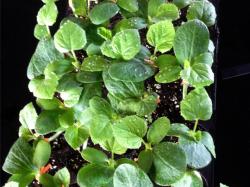University Of New Hampshire Melon Research Produces Higher Yields
September 30, 2015 | 3 min to read

DURHAM, N.H. – Researchers at the University of New Hampshire have found that grafting melons onto the rootstocks of hybrid squash substantially increases the production of melons, a potential source of increased revenue for New England farmers.
The research is being conducted by Brent Loy, professor emeritus of plant biology and genetics, and graduate student Janel Martin, both researchers with the NH Agricultural Experiment Station. Loy and Martin are conducting the melon research project at the experiment station’s facility, the Woodman Horticultural Research Farm.
Preliminary data from the NH Agricultural Experiment Station grafted melon project indicates that the grafted melon plants experience increased growth and vigor while the melons have higher sugar content and yield compared with nongrafted melons.
“The comparison between the grafted and nongrafted plants is striking when looking at the field. The yield of the melons from the grafted melon plots was much higher than we anticipated as well as the uniform look and size to some of the melons harvested from the plots with the grafted plants,” said Martin, who earned a bachelor’s in Sustainable Agriculture and Food Systems from UNH.
Melons do not grow well in cooler temperatures, and melon vines may be affected by Sudden Wilt that makes them unharvestable. As a result, researchers are using the rootstocks from several squash hybrids to grow melons. Loy has developed numerous squash varieties that are disease resistant, some of which are being used in this melon project. The hybrids are widely used as rootstocks for growing melons in Asia, Middle East, and Europe, and are being promoted for melon production in North America.
“Once the plants had a full amount of fruit to ripen, and the summer heat was in full force, the nongrafted plants started to wilt and become stressed. The grafted plants were unaffected, and continued to grow and ripen fruit. The grafted plants filled the space between the rows, which helps the plant to continue to support the ripening fruit as well as block out weeds that try to grow between the rows,” Martin said.
Ultimately, the researchers want to develop an effective system to mitigate Sudden Wilt to assist New England melon growers. Soil borne diseases are hard to combat, and traditional treatment methods have side effects to the health of the soil and are costly to implement. In addition, the cooler New England climate creates a very short window of opportunity to grow warm weather crops such as melons.
Little research has been done on growing melons using the grafting method in cooler climates such as New England and in a field setting with varieties that are acceptable to area consumers.
“If we can help increase revenue for farmers, and, at the same time, have local produce that may have a much lower ecological impact, it will be a win-win,” Martin said. “I want my research to help create a more sustainable food system that will improve the quality of our food and the quality of life for those who produce and consume it.”
This material is based upon work that is supported by the National Institute of Food and Agriculture, U.S. Department of Agriculture, under award number 0233556.
Founded in 1887, the NH Agricultural Experiment Station at the UNH College of Life Sciences and Agriculture is UNH’s original research center and an elemental component of New Hampshire's land-grant university heritage and mission. We steward federal and state funding, including support from the USDA National Institute of Food and Agriculture, to provide unbiased and objective research concerning diverse aspects of sustainable agriculture and foods, aquaculture, forest management, and related wildlife, natural resources and rural community topics. We maintain the Woodman and Kingman agronomy and horticultural farms, the Macfarlane Greenhouses, the Fairchild Dairy Teaching and Research Center, and the Organic Dairy Research Farm. Additional properties also provide forage, forests and woodlands in direct support to research, teaching, and outreach.
The University of New Hampshire, founded in 1866, is a world-class public research university with the feel of a New England liberal arts college. A land, sea, and space-grant university, UNH is the state's flagship public institution, enrolling 13,000 undergraduate and 2,500 graduate students.
Source: University of New Hampshire Agricultural Experiment Station
